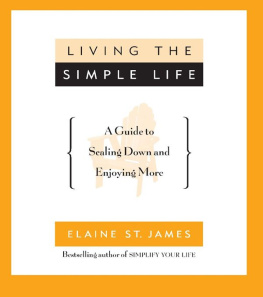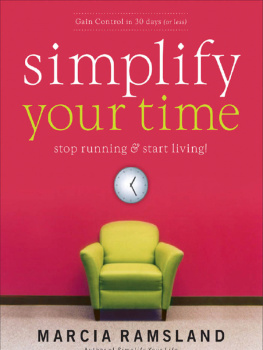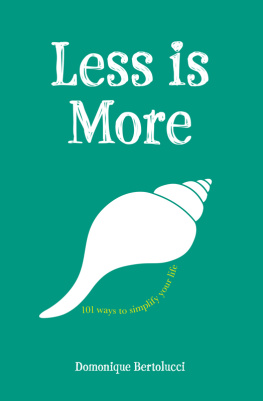SIMPLIFY
YOUR WORK LIFE
Ways to Change the Way
You Work
So You Have
More Time to Live
ELAINE ST. JAMES

To
Pat Rushton and Catha Paquette
Heres to another eight years of supporting
each other in doing the work we love
CONTENTS
A few years back I had a very hectic life and an even more hectic work schedule, the pace of which was probably not all that different from yours. Over the previous fifteen years I managed my own real estate investing business, I ran seminars, and I wrote a book on real estate investing. I got into real estate because I didnt know what else to do, and once I was in I never had the time to figure out how to get out.
Eventually I was working sixty hours a week and was seldom able to spend quality time with my family and friends or even to have time on my own to relax and just putter around the house. I rarely took a vacation and almost never thought about how work had taken over my life.
One day, while looking at my to-do lists, I realized how complicated and out of balance my life had become. I decided right then and there that it was time to simplify. I started by getting rid of a lot of the clutter. I streamlined the cooking, thecleaning, the laundry, and the other household routines; I minimized my wardrobe and drastically changed my consumer habits; and I learned how to say no to the demands on my time.
I also cut back my work schedule. It was a step-by-step process, but by working less I found that I was not only more productive, I also had the time to be more creative and to think about what I wanted to do with my life. Over the next several years I saw that it was time to let go of the real estate business completely. It seemed the height of insanity to spend the majority of my time doing something I didnt truly enjoy.
Then, when people started asking me how I had simplified my life, I took the leap and wrote a book about it. That book, Simplify Your Life, became a bestseller. With all the media interviews, the promotional tours, and another book in progress, my work life suddenly had the potential to get complicated all over again. But I was committed to keeping life simple, which Ive done. As my writing career developed, I gradually went from my frenetic sixty-hour week to working roughly half that time.
Since then Ive come to a new understanding about my life, my work, and my reasons for working. I believed for years that I was working for the money. But I found, as many people have, that money simply isnt reason enough to keep up the grind. I found, as many people are finding, that Im most productive, most committed, most happy, and most financially rewarded when I love the work I do.
So, contrary to what some may believe, simplifying is not about retreating to a cabin in the woods and leading a dull, inactive existence. Rather, cutting back your hectic work pace gives you the opportunity to make sure that youre doing work you love. If youre not, you can change what you do. Simplifying will also help you create the balance youre seeking in your work life, your family life, and your personal life. Out of that balance youll have more clarity and enthusiasm to meet your goals. Youll learn how to achieve the success you want without stress and overwork. And simplifying will give you the time to develop a rich and rewarding inner life. Having that inner connection will make it so much easier to move beyond societys demands and expectations about work.
You might have any number of reasons to simplify your work life and any number of goals in mind for doing so.
You may be looking for ways to cut back on the amount of time you work so youll have time to spend with your family and to do your own puttering around the house. Ill share many ways to free up more time in .
You may love your work but feel that the demands on your time keep you from getting as much done each day as you knowyou could. In Ill show you how to be more productive so you can can cut back on the number of hours you work each week.
You may find that one of the reasons you work so much is that you just cant say no and that inability to set appropriate boundaries keeps you chained to your job. Ill show you some things Ive learned about setting boundaries and working effectively with others in .
You may be intrigued by the idea of simplifying your work life but believe that its just not possible financially for you to change the way you work. In Ill show you how to address the financial issues that may be keeping you locked into a work situation youre not happy with and how to build a new level of financial freedom and security for you and your family.
You may want to restructure your current work by telecommuting, job sharing, arranging a more flexible schedule, or even starting your own business. The opportunities for new ways to work are practically unlimited today. Ill discuss many of these options in .
You may be tied to outdated ways of thinking about your work and the hours you must spend earning a living, but you should know that theres a whole new world out there now. Just changing the way you think about work will give you anew lease on your work life. Youll find some ways to do that in .
Though many of the ideas in this book describe office situations, theyre relevant for all walks of life. No matter what kind of work you do, youll find numerous ways to cut back, work more effectively, set appropriate boundaries, become more efficient with your money, and begin to take advantage of the changes that are happening in the workplace.
I invite you to join me in moving with purpose and intention to a simpler work life. This might appear to be a gigantic leap from where youre standing, but once you start the process youll be able to look back and see that it was really quite a small step. That step is to decide, right now, that youll do what it takes to keep your work in balance with the rest of your life.
Ive been where you are now. I know how challenging it can be to change the way you work. But if I did itand, as well see, thousands of others are doing ityou can, too. Come along with me. Let me show you how you can change the way you work so you have more time to live.
ONE
Cutting Back on the Amount of Time You Work
I f youre thinking of cutting back on the amount of time you work, youre not alone. Thousands of American workers are cutting back. After nearly a quarter century of exhausting work schedules, were coming to our senses and starting to make some changes. A recent Yankelovich poll shows that were changing how much we work: One in five of us says weve taken a cut in pay to work less. Were changing how we work: Nearly half say weve changed jobs to have more family time. Were changing the way we think about work: Eight out of ten people say we admire someone who puts family before work.
Look around. You probably know people whove cut back their work schedules, whove moved to worker-friendly offices, whove created a more flexible schedule, or who have in one way or another made significant changes in the way they work. Certainly youve read about them. Practically every magazine or newspaper you pick up these days has a story about how peopleare looking for more balance in their lives and have made the decision to work less. And their numbers are growing every day. The Families and Work Institute reports that in a survey conducted in 1992, 47 percent of the respondents said they wanted to work less; in 1997, 63 percent said they wanted to work less. According to the Trends Research Institute, simplifying will continue to be one of the leading trends of the new millennium.
Next page









